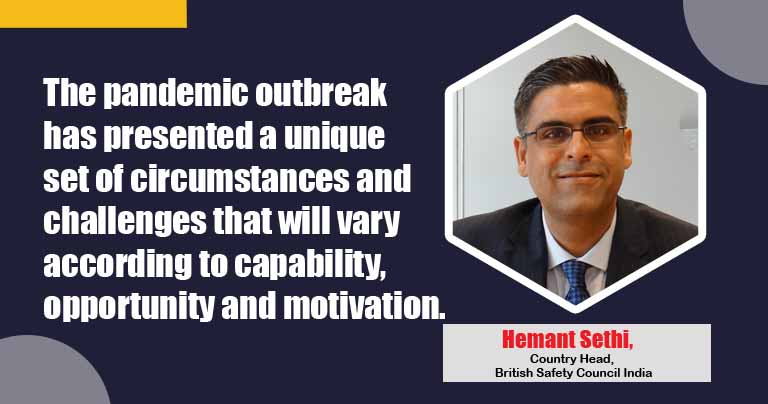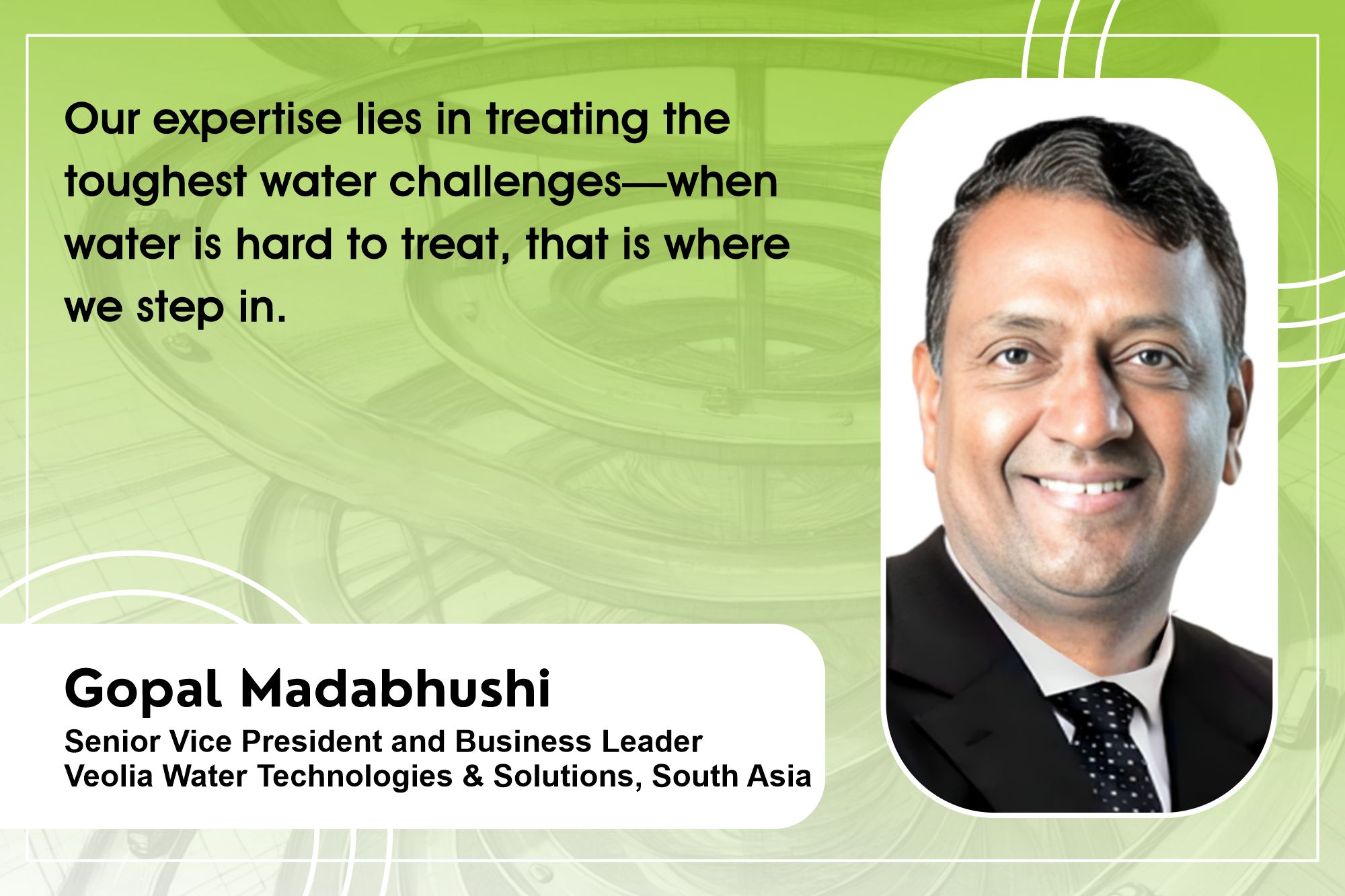How pandemic is reshaping industrial outlook on workplace safety
By Edit Team | November 12, 2021 4:10 pm SHARE

“There are several parameters in safety audit programs under which an organisation must excel to attain safety credibility,” says Hemant Sethi, Country Head, British Safety Council India.
The COVID-19 pandemic has changed the way industries function, and at the same time, it has heightened the significance of industrial health and safety programs. One notable change is that several Indian companies, many of which previously lacked adequate health and safety programs have now started integrating and upgrading their workplace safety programs.
Companies have started equipping the employees with appropriate competencies to operate in the workplace safely, and healthconsciously. By enabling employees to protect themselves physically and mentally, organisations have started transforming their safety culture by making it more people centric. Some of these changes include better technology and machines, improved workplace architecture, heightened health and safety norms, and a lot more.
The COVID-19 pandemic has led businesses to take a long hard look at their processes, drive changes, and implement measures to sustain growth and profitability. Most businesses have a pandemic safety protocol in place by now, based on government regulations However, implementing this can be particularly challenging. This is especially truewhen it comes to infrastructure and construction projects, as workers cannot work from home and often must work in very close proximity to others.
Reassessing safety protocols and communication will be crucial post pandemic
Based on safety assessments last year, there is evidence of how innovative organisations have been in managing the crisis. Taking a cue from this, companies would do well to reassess their Covid safety protocols in the following areas – risk management and control measures.
While assessing risk, companies should consider several factors, including – workplace setup, workflow, travel, operational activities, workplace occupancy, and working shift patterns among other things. Control measures should include remote working, health surveillance, and testing, social distancing and workplace adjustments, hygiene controls, ppe, staff wellbeing.
Sharing information, understanding the control measures selected, and of the underlying approach, is essential in ensuring compliance. To communicate this effectively, visual information through posters, signs, screen-saver prompts, and televisual presentations at entrances, exits, and throughout the workplace are going to play an important role.
‘‘The pandemic outbreak has presented a unique set of circumstances and challenges, and each of the control measures outlined relies on behaviours, which will vary according to changes in capability, opportunity, and motivation, for them to be effectively implemented,” says Hemant Sethi, Country Head, British Safety Council India.
There is also a high risk of ‘Covid Fatigue’ where peoples’ compliance with adapted controls and expectations starts to erode. The well-being, particularly mental health issues such as stress, anxiety, post-traumatic stress, and depression will be primary concerns for employers across all sectors.
When restrictions are slowly relaxed, businesses will again need support to develop their plans to bring their employees, clients, customers, and visitors safely back into their workplaces. At this time, an updated Covid-19 risk management guide that includes all the measures described above may be a vital tool in the company’s arsenal against the pandemic.
Safety solutions that companies should look at in the future
Some of the safety solutions that companies should consider are listed below:
Impart COVID-19 safety training to employees
Employers must invest in COVID-19 safety training for employees to bring out the necessary behavioural changes related to health and safety. COVID-19 safety training should include practices regarding workplace cleanliness, waste management, hand hygiene, and instructions on using PPE, among others. Businesses should also consider an external assessment and consultancy service through recognised health and safety organisations, for training employees.
New skills required to tackle challenges
The pandemic and consequent challenges to workplaces denote the workplace culture change’s vitality to protect employees’ physical and mental health. Here, organisations can work closely with an external safety audit and consultation expert to help them upgrade their safety culture and integrate new skills into their employees. There are various skills that organisations can focus on and enable their employees to learn and implement these skills in their daily work-life. Below are some of the skills that such organisations can focus on includes workplace ergonomics, environmental safety skills, equipment safety skills, cybersecurity skills and mental health skills.
Integrating Environmental Health and Safety (EHS) audit processes
Most companies may have a Covid safety protocol in place by now, based on government regulations. However, it helps to have these protocols audited by an ESH expert.
An audit involves very in-depth analysis and rigorous examination of processes. It helps benchmark and validates ongoing initiatives to deal with the pandemic and other industrial risk scenarios. The assessment may be based on a host of areas including assessing risks, planning control measures, allocating roles and responsibilities, implementing, and maintaining controls, communication, and training, monitoring effectiveness, and reviewing and revising arrangements.
There are several parameters in these safety audit programs under which an organisation must excel in order to achieve perfect safety credibility. Companies should seize the opportunity and implement these safety audits so that workplace health risks are identified, assessed and mitigated across the board.
Outlook on industrial and construction safety in the coming years
Industry experts agree that the focus on safety, health, sustainability, and cost reduction is already shaping the business strategy of most companies for 2022. Several businesses have already made significant investments to future-proof their organisations by upgrading safety protocols and bringing in newer skills to ensure that these are successfully implemented across their premises. They also point out that premium assets will not be evaluated on rents alone but HSE (health, safety, and environment) standards.
Several companies have already made significant investments in upgrading safety protocols across their premises. Even with the rollout of the vaccine, safety and health will continue to be factors determining occupier preferences. Hence in the months to follow, as India carefully navigates its way out of the pandemic, the industries would stand to benefit by ensuring that their safety protocols continue to remain in place. This can be achieved by having a proactive and robust Covid risk mitigation strategy monitored by an audit mechanism.
Cookie Consent
We use cookies to personalize your experience. By continuing to visit this website you agree to our Terms & Conditions, Privacy Policy and Cookie Policy.




































-20240213125207.png)

























